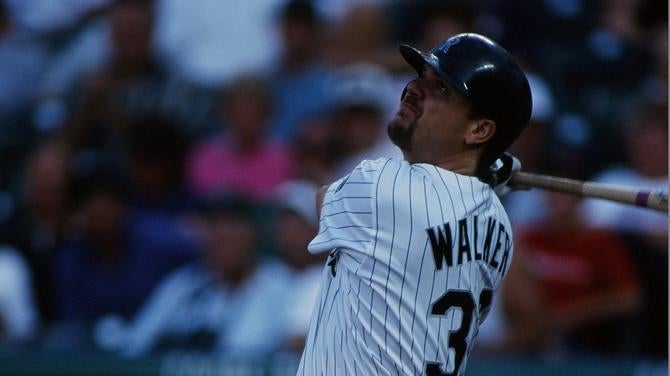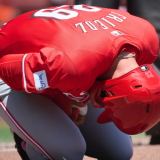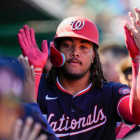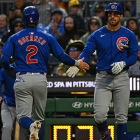Leading up to the announcement of the 2017 Baseball Hall of Fame class on Jan. 18, we're examining each of the 34 candidates on this year's BBWAA ballot. By way of reminder, a candidate must be named on at least 75 percent of submitted BBWAA ballots in order to be elected into the Hall of Fame.
We've already looked at the numerous candidates who are certain to fall off the ballot after only one year (candidates receiving less than five percent drop off the ballot). Now we're looking at those hopefuls who figure to have meaningful support and perhaps even earn induction at some point. Up this time around is the all-around excellence of Larry Walker.

Walker played 17 seasons in the big leagues from 1989-2005. He broke in with the Expos, spent most of his career with the Rockies and closed out his career with the Cardinals. Walker retired as a .313/.400/.565 (141 OPS+) hitter and is one of only 19 hitters in history with a .300/.400/.500 batting line in at least 5,000 career plate appearances. Among those 19, only six started their careers after 1960.
During his 17-year career Walker went to five All-Star Games and won seven Gold Gloves. He was the 1997 NL MVP after hitting .366/.452/.720 (178 OPS+) with 46 doubles, 49 home runs, 130 RBI, 33 steals and 9.8 WAR. Walker also received MVP votes in seven other seasons and thrice finished in the top 10 of the voting (1992, '95, '99).
The case for Walker
The term "five-tool player" gets thrown around way too often these days, but Walker was a true five-tool talent. He could beat you in so many ways. With his bat, with his legs and with his defense. Walker slugged 471 doubles and 383 homers in his career, stole 230 bases, drove in 1,311 runs and drew 913 walks against only 1,231 strikeouts.
On top of that, Walker was a strong right field defender during his prime who retired with 72.6 WAR. That's 21st all-time among outfielders and fifth among outfielders who began their careers within the past half-century:
- Barry Bonds: 162.4 WAR
- Rickey Henderson: 110.8 WAR
- Ken Griffey Jr.: 83.6 WAR
- Reggie Jackson: 73.8 WAR
- Larry Walker: 72.6 WAR
That's some company, huh? (Carlos Beltran is right behind Walker at 70.4 WAR.)
Not counting his rookie season in 1989, when he appeared in only 20 games, Walker never finished a season with an OPS+ under 110. Only three times did it dip under 120. He amassed at least 3.0 WAR in 10 different seasons as well. Walker was, quite simply, one of the best all-around players of his era. The man really could do it all on the field. Hit and defend.
The case against Walker
The two biggest knocks against Walker as a Hall of Famer are injuries and Coors Field. Let's break them down individually.
Injuries: Due to a variety of injuries, Walker appeared in only 1,083 of 1,458 possible games from 1996-2004. That's 375 missed games, more than two full seasons worth. Those were his age 29-37 seasons as well, so there were some peak years in there. Walker played fewer than 90 games in three different seasons (1996, 2000, '04) and never played at least 140 games in back-to-back seasons.
All the missed time took a bite out of Walker's counting stats. He retired with 2,160 hits, 383 home runs and 230 stolen bases and that's very impressive, but those totals don't make you think "Hall of Famer" at first glance. Had he stayed healthy, Walker might have been able to eclipse 2,500 hits, 450 homers and 300 steals. Now those numbers grab your attention. The injuries hurt Walker's bulk production. No doubt about it.
Coors Field: Walker played most of his career with the Rockies, which means he benefited from hitter friendly Coors Field. He was a career .381/.462/.710 hitter at Coors Field (!) and a career .282/.375/.501 hitter away from Coors Field. That's still really good! But clearly Walker's offensive stats were inflated by the thin mountain air.
It's important to keep in mind only 2,501 of Walker's 8,030 career plate appearances came at Coors Field, or 31.1 percent. Nearly 70 percent of his career plate appearances came elsewhere, so it's not like his career numbers are solely the product of that ballpark. He wasn't Ted Williams at Coors Field and Neifi Perez elsewhere, you know? Playing at Coors Field undeniably boosted Walker's stats. The man was great everywhere he played though.
Will he make it?
This is Walker's seventh year on the Hall of Fame ballot and he topped out at 22.9 percent of the vote back in 2009. According to Ryan Thibodaux's tracker, Walker has appeared on fewer than 30 percent of the publicly available ballots this year, so he isn't getting much additional support, if any.
The good news: Walker has received more than five percent of the vote and will remain on the ballot another year. The bad news: Walker has already been mathematically eliminated from receiving the 75 percent needed for induction. He won't get into the Hall of Fame this year.
Walker has three more years left on the ballot, and given how little his support has increased over the years, it seems very unlikely he'll be elected into Cooperstown by the BBWAA. Based on his voting totals, it would have taken a Rich Lederer/Bert Blyleven or Jonah Keri/Tim Raines style campaign for Walker to generate enough support for the Hall of Fame, and it's too late for that now.
Hall of Fame or no Hall of Fame, Walker will go down as one of the greatest players of the 1990s and 2000s. He was an MVP and you couldn't take your eyes off him on the field. Walker did everything and he did it well.
Other Hall of Fame cases: Posada | Ramirez | Guerrero | Rodriguez | Sosa | Wagner | Walker






















